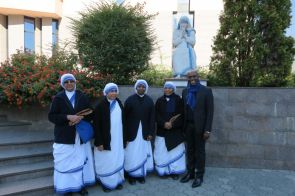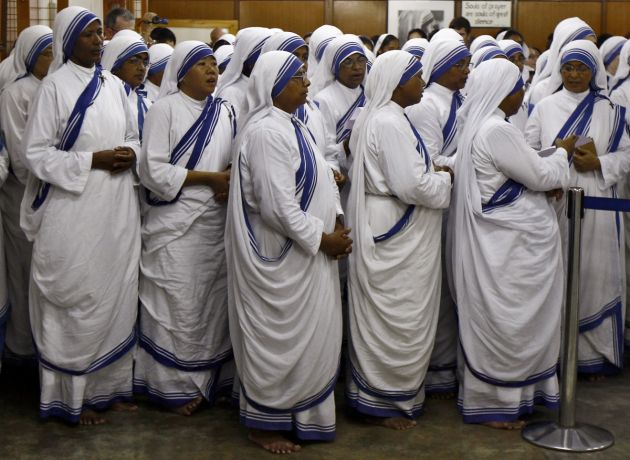Mother Teresa's sainthood still stirs debate, but she inspires Pope Francis

In the Indian city of Kolkata where Mother Teresa worked with the poor the residents are holding prayers, talks and cultural events.
But there is no major ceremony planned to mark the path to sainthood for the two miracles of healing attributed to Mother Teresa, Reuters news agency reports.
Albanian-born Mother Teresa became one of the most iconic champions of the poor in the 20th century, is set to become a Catholic saint when Pope Francis leads an open-air Sunday Mass Sept 4.
From the work in Kolkata where the Missionaries of Charity worked, the Catholic nuns become known throughout the world and Mother Teresa became a Nobel Peace Prize laureate.
She spent her life with her fellow nuns caring for the dying, the homeless and orphans who live in the jam-packed streets of the eastern Indian city.
By the end of her life she was like Nelson Mandela, she was sought out by the famous and the powerful who wanted to be seen to have been in contact with her.
They included U.S. presidents and Britain's Princess Diana.
During her life, Mother Teresa was named 18 times in the yearly Gallup's most admired man and woman poll as one of the 10 women around the world who Americans admired most, finishing first several times in the 1980s and 1990s, Wikipedia reports.
MISSIONARIES OF CHARITY GOING STRONG
The order founded by Mother Teresa is going strong without her charismatic leadership, 19 years after she died.

The nuns also drew criticism for propagating what one sceptic has called a cult of suffering, Reuters reported.
They also faced accusations of failing to treat people whose lives might have been saved with hospital care; and for trying to convert the destitute to Christianity.
While staying true to their cause, the Missionaries of Charity say they have responded to their detractors.
"There is no change in our way of treating the sick and dying – we follow the same rule that Mother had introduced," said Sister Nicole, who runs the Nirmal Hriday home in the ancient district of Kalighat, the first to be set up by Mother Teresa in 1952.
The nuns no longer pick up people "randomly" off the streets, she said, and only at the request of the police do the take in the destitute, said Reuters.
"Any good work will be challenged - but if the work is genuinely good it will survive such criticism and carry on to be God's true work," Nicole said.
Matt Bradley commented for NBC that much of the criticism of Mother Teresa focused on how her practice of Catholic devotion collided with the real needs of the impoverished people she set out to help.
In the eyes of some, particularly in India, she put fame and piety before her mission of aid.
Among other critiques, she has been accused of offering stingy or substandard medical care; of proselytizing to her patients; of claiming virtue in suffering rather than trying to alleviate it; cozying up to dictators; and of promoting her efforts to a global media eager for heroes.
"I personally think that she did more harm than good," said Bradley.
Father Brian Kolodiejchuk, the Canadian priest who promoted her sainthood cause, said Sept. 1 in the Vatican that hundreds of thousands of faithful are expected to attend the canonization service in front of St. Peter's basilica, The News Nigeria reported.
He said that her canonization is one of the highlights of Francis' Jubilee of Mercy.
He said she was affectionately called the "saint of the gutters" during her lifetime, and Teresa will be made an official saint of the Roman Catholic Church on Sept.4, just 19 years after her death.
"The Church defines saints as those believed to have been holy enough during their lives to now be in Heaven and able to intercede with God to perform miracles.
"She has been credited with two miracles, both involving the healing of sick people,'' he said.
Kolodiejchuk said that Mother Teresa was one of the most influential women in the Church's 2,000-year history, acclaimed for her work amongst the world's poorest in the slums of the Indian city now called Kolkata.
He noted that critics view her differently, arguing she did little to alleviate the pain of the terminally ill and nothing to stamp out the root causes of poverty.
The priest recalled that in 1991, the British medical journal the Lancet visited a home she ran in Kolkata for the dying and said untrained carers failed to recognize when some patients could have been cured.
Kolodiejchuk said her detractors missed the point of her mission, arguing that she had created a place to comfort people in their final days rather than establish hospitals.
'EVEN SAINTS AREN'T PERFECT'
"We don't have to prove that saints were perfect, because no one is perfect," he said.
He said that several events are planned in the run up to the ceremony, including a prayer vigil on Friday, an audience in St Peter's Square with Francis on Saturday morning.
Kolodiejchuk said it would be followed in the evening by a veneration of Teresa's relics in a Roman basilica outside of the Vatican.
"As the canonisation falls on the eve of Teresa's feast day, which marks the anniversary of her death on September 5, 1997, there are expected to be more celebrations and religious services on Monday and later on in the week," he said.
Kolodiejchuk noted that Sept. 7-8, the room Teresa used on visits to Rome, in the convent of the Church of San Gregorio Magno near the Colosseum, where her Missionaries of Charity have a local branch, will be open to pilgrims.
Kolodiejchuk said that the Indian Foreign Minister, Sushma Swaraj and other dignitaries from Teresa's adopted nation are scheduled to attend the Mass.
Mother Teresa was born Agnese Gonxha Bojaxhiu of Albanian parents in 1910 in what was then part of the Ottoman Empire and is now Macedonia.
At the age of 16 she became a nun at 16, moving to India in 1929, where she set up her mission in 1950.
Private letters published after her death in 1997 show she despaired for the last 50 years of her life over having lost a personal connection with Jesus, while she continued steadfastly to serve his cause.
Still, in a preface to a book Teresa, published in July, Pope Francis recalled how giving to the needy is fundamental to Christian teaching.
Francis said that "Mother Teresa made this page of the Gospel the guide for her life and the path to her holiness and it can be for us, as well."
